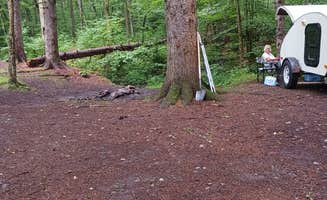Dispersed camping near Westfield, New York provides options in several state forests and public lands across the New York-Pennsylvania border region. The area sits within the Allegheny Plateau, characterized by rolling hills and mixed hardwood forests with elevations ranging from 1,300 to 1,800 feet. Winter temperatures can drop below freezing from November through March, while summer highs typically reach the mid-80s with moderate humidity.
What to do
Wildlife viewing opportunities: Camp Seneca offers excellent locations for watching local wildlife, particularly along the creek that runs through the property. According to Kevin C., "We picked the biggest site next to the creek. The tree canopy over our site was dense enough that we did not get very wet when it rains."
Target practice options: While not ideal for all campers seeking solitude, FR437 dispersed campsite in Pennsylvania offers proximity to an informal shooting area. As one camper noted, "nice little hideaway, it is however right across from where people have made a make shift shooting rang, which I thought to be a bonus."
Creek exploration: Multiple sites allow access to seasonal creeks and streams. These waterways typically flow strongest in spring and early summer but may reduce to a trickle during late summer drought conditions. Wading and small-scale fishing are possible depending on water levels and local regulations.
What campers like
Complete solitude: Many dispersed sites around Westfield remain undiscovered by weekend crowds, particularly on weekdays. One camper at Camp Seneca reported, "We came into the area on a Monday and this camp was completely empty. We had a few hikers come through and one other camper that chose not to stay."
Basic amenities at primitive sites: Some dispersed camping areas offer more features than expected. Kevin C. mentions that Camp Seneca "had several designated sites and most have a fire ring and picnic table. There was a porti-poty on site that had plenty of paper was pretty clean."
Accessibility without crowds: Most dispersed sites near Westfield remain available even during peak summer weekends when developed campgrounds fill up. The trade-off is fewer amenities and sometimes challenging access roads, but campers appreciate the availability without reservations.
What you should know
Overnight permissions unclear: Some areas have conflicting signage regarding overnight stays. At Warner Road Dispersed Camping, Denise D. warns, "Clearly people are camping here at times but there are posted signs that say Day Use Only. It was quiet and dark."
Litter management issues: Several dispersed sites suffer from previous campers leaving trash behind. Rose S. notes that Warner Road camping had "Kind of a gross site, the previous people who stayed at our site were messy and left litter, but it served its purpose as a free place to sleep along a longer trip."
Weather preparedness essential: The region experiences rapid weather changes, particularly in spring and fall. Dense tree cover at some sites provides moderate protection, but campers should prepare for sudden temperature drops and precipitation. Tree canopy density varies significantly between sites.
Tips for camping with families
Site selection considerations: Choose sites with established fire rings and level tent pads when camping with children. Look for areas with some natural boundaries like fallen logs or rock outcroppings that help define camping space for younger children.
Basic sanitation planning: Only McCarthy Hills Forest and similar true primitive sites lack toilet facilities entirely. Most designated dispersed sites have at minimum a vault toilet or portable facility. Pack additional sanitation supplies for extended stays.
Night visibility preparation: The area offers exceptional darkness for stargazing, but this means very limited visibility around camp after sunset. Pack multiple light sources, reflective markers for tent lines, and glow sticks for children to prevent nighttime accidents.
Tips from RVers
Access road assessment: Most forest roads leading to dispersed sites have seasonal maintenance only. Spring conditions often include muddy sections and occasional washouts. Call the local ranger district before attempting access with larger vehicles after heavy rain.
Length limitations: Even sites labeled as "big-rig friendly" have practical limitations. Warner Road Dispersed Camping can accommodate larger vehicles at pull-offs, but maneuvering space is limited, and trees may restrict turning radius.
Leveling challenges: Bring extra leveling blocks as most primitive sites lack graded parking areas. The natural terrain throughout the region includes subtle slopes that can significantly affect comfort in larger RVs and trailers.


